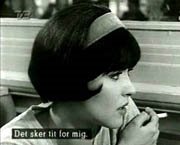duas cenas
Existe uma cena em Vivre Sa Vie, um filme de Godard, em que Brice Parain, representando nenhum papel, tem um diálogo com Anna, a protagonista. O café parisiense e o fumo compõem o cenário d
 a conversa casual entre uma mulher fascinante, mas em decadência, e o filósofo pronto a partilhar momentos e palavras que iluminam por momentos os olhos epifânicos de Anna.
a conversa casual entre uma mulher fascinante, mas em decadência, e o filósofo pronto a partilhar momentos e palavras que iluminam por momentos os olhos epifânicos de Anna.Extrai-se do diálogo que as palavras existem para expressar o pensamento. E também que o pensamento nada é para nós se não o pudermos alcançar com as palavras. Assim, a palavra é-nos necessária. Uma prisão que desperta e liberta. Há um núcleo comunicador irredutível na nossa espécie, que devém da nossa essência pensante. E Parain fala da morte em vida, da renúncia à vida que é necessária se quisermos falar bem. Quanto mais exactos em relação à incógnita linguagem do mundo-mesmo queremos ser, mais afastados estamos da vida desinteressada da sua relação connosco. É a trágica escolha entre a vida e a sabedoria, que tão bem espelhada está no Zaratustra de Nietzsche.
Não consegui encontrar o diálogo no francês original, mas deixo-o em inglês:
“Nana: Why must we express ourselves? To understand each other?
Parain: We have to think. To think we need to speak. There’s no other way. And to communicate, humans must speak.
Nana: But at the same time it’s very difficult… whereas I think life should be simple. Your Three Musketeers story is very beautiful but it’s frightening.
Parain: It’s frightening but it gives a clue. We’re only able to speak well after we renounce living for a while. It’s the price we pay.
Nana: Is speaking fatal?
Parain: Speaking is a sort of resurrection and life with speech is different from life without it. So, to live with words you must go through the death of life without them. I don’t know if I’m explaining myself… there’s an asceticism which means that you can only speak well when you look at life with detachment.
Nana: But you can’t live everyday life with, I don’t know, with…
Parain: With detachment? That’s why we swing between silence and speech. We swing between the two because life is such that we go from everyday life into another life which is much higher because it’s a thinking life. But this thinking life involves the killing of life that is too mundane.
Nana: But is thinking and speaking the same thing?
Parain: I think so. Plato said it was. It’s an old idea. In thought I don’t think we can separate thinking from the words we use to express it. If you analyze consciousness you can only grasp a moment of thought with words.
Nana: So to speak is to risk lying?
Parain: Yes, because lying is a way of seeking. There’s little difference between an error and a lie. I’m not talking about ordinary lying… But as for subtle lying, it’s often very close to a mistake. You just can’t find the exact word. You said you often didn’t know what to say. That’s because you fear not finding the right word.
Nana: How do you know what the right word is?
Parain: You have to work at it. It takes effort. Say what must be said in a way that’s appropriate, that isn’t hurtful, that says what must be said, that does what it’s meant to do without hurting or wounding.
Nana: Yes, you have to try to be sincere. Someone said to me, truth is in everything, even in error.
Parain: It’s true. They didn’t realize it in France in the seventeenth century when they thought you could avoid error. Not only lies but error. And live in truth. I don’t think it’s possible. That’s why Kant and Hegel and German philosophy brought us back to living and the fact that we must reach truth through error.
Nana: What do you think of love?”
“Le parole sono importanti!”
Há depois as cenas entre Michele Apicella (Nanni Moretti, que é também o realizador) e a jornalista que o entrevista em Palombella Rossa.
 Michele desespera com a forma como a jornalista fala, de forma desregrada, descuidada e plena de clichés e estrangeirismos.
Michele desespera com a forma como a jornalista fala, de forma desregrada, descuidada e plena de clichés e estrangeirismos.“- No... io non lo so, però senz'altro lei ha un matrimonio alle spalle a pezzi...
E eis o culminar do cuidado de Michele, a suma da sua teoria:
“- Chi parla male, pensa male e vive male. Bisogna trovare le parole giuste: le parole sono importanti!”
Pedro Sargento

